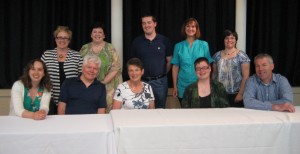
WCSC Group: Back row, WCSC exec Noelle Bickle, Elizabeth Young, Dan Mansfield, Deepam Wadds, Gavy Swan. Front row, panelists Erin Thomas, Bill Swan, Karleen Bradford, Cheryl Rainfield, Tom Earle
One of the perks of having my daughter go to school on a modified calendar is more breaks through the year. It’s good for us as a family. Sometimes not so productive for me as a writer, though, so with Sarah just getting back to school now after a week off, I’m still clearing the cobwebs from the writing bits of my brain.
Luckily, I was at a writerly event yesterday that gave me lots of advice to share here. I was invited to speak to the Writers’ Community of Simcoe County as part of a panel on Young Adult writing. Other panelists included Cheryl Rainfield, Bill Swan, Tom Earle and Karleen Bradford. Can you blame me for taking notes while the others shared their stories?
Here are some of my favourite parts.
Cheryl Rainfield shared a definition she likes, that a published author is just a writer who hasn’t given up. Her GG-nominated novel, Scars, had a ten-year journey to publication. Many publishers and agents were scared off by the darker aspects of the book, but Cheryl kept trying. Her persistence paid off. Now she’s inspired by the readers who write to her, telling her how the book has changed their lives and made them feel less alone.
Bill Swan advised the new writers in the group that once you have a manuscript accepted by a publisher, that’s just the beginning. Lorimer accepted his first manuscript and wanted just two things changed: one was the tense the novel was written in, one was the gender of the main character. It took a lot of research, a complete rewrite and a lot of edits before the book was ready for publication.
Bill’s in my writing group, and he’s the source of one of my favourite similes about writing and editing. He says a novel is like a house of cards: You’ve built it up so very carefully, and then someone comes along and says it would be a lot better if just one card were removed. Except that one card is at the bottom, in the middle. It makes me smile because I’ve knocked down many a house of cards, including my current work-in-progress. But the thing to do is rebuild and make it stronger.
Karleen Bradford shared a story about a student asking her if, as a writer, she was easily squashed. “Yes,” she said. “All writers are.” She remembered a teacher, when Karleen was 13 years old, tearing apart one of her stories. It made her feel she wasn’t good enough to be writing; she didn’t write fiction again for nearly twenty years. Hearing this made me feel grateful for my writing group and for the classes I’ve attended where the critique offered has been constructive rather than discouraging.
Karleen talked about her growth as a writer, and suggested that short stories can be the best training ground–writing a story in a confined space requires you to hone your craft. And, like Cheryl, she advised all aspiring writers to be stubborn.
Tom Earle grew up around boats and hockey. “If it’s hard, you skate on it. If it’s wet, you put a boat in it.” He identifies himself as a teacher more than a writer, but following the advice to write what you know, he wrote a book about hockey players. More than that, he wrote a book just for the sake of writing it. He was watching a Leafs game when one player was knocked out in a fight. Seeing that stayed with him. He started thinking about what would happen if a hockey player were killed during a fight. What would it be like to live with that? What would happen? He scribbled his novel in stapled composition notebooks, the same kind his students use, and then forgot about it until he came across one of the notebooks again and decided there was something in there worth pursuing. He wrote a story for himself, and it got published.
It’s harder for me to remember what I talked about. I had my notes (on colour-coded index cards, of course), but I didn’t take notes while I was talking. I think the main thing I wanted to get across was the importance of community in writing, and how belonging to groups like CANSCAIP and the Writers’ Community of Durham Region (or Simcoe County, or anywhere) can make a difference. How having a small critique group of writers you trust can keep you on track and help you improve.
I also wanted to encourage people to write now, rather than waiting. If there’s a story you want to tell, tell it.
I felt honoured to be on that panel. Karleen Bradford is someone whose books I loved when I was a kid. The WCSC people were wonderful and welcoming, and I hope that they enjoyed the talks and learned a lot — I know that I did!
